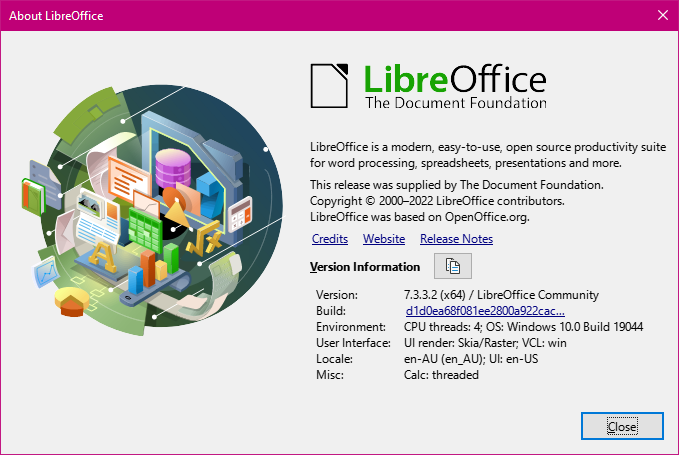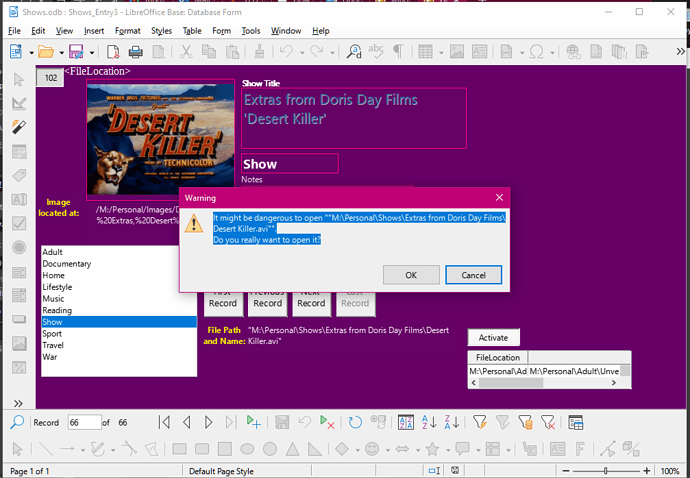I have developed a DB for cataloguing and playing videos and readers. When I press the activate button, I get the warning shown in the attached image. How do I get rid of the warning?
That warning comes from your anti-virus or something. Base passes the URL of the file to be opened to the desktop system (Windows?).
Possibly it’s tdf#128969 (and the commit indicated in comment 16 there, introducing the screenshoted message). OP’s screenshot shows the dialog text selectable, which is unusual on Windows (and most of the time indicates it’s a LibreOffice dialog).
Thanks for your help so far. I agree with your thinking. I note that according to comment 16 you site, this is a fault that should have been fixed by version 7.3.0. See attached image of my current LO version.

I also agree that the warning is not from the OS or Malware protection as indeed the OS does not allow selection (and copying) of text in such a warning. Also, when I open using my default player (VLC), I do not get the warning. What now?
No, it was introduced in 7.3 - before that, an error message was shown in such cases, and now the dialog to confirm an unsafe operation.
Is it possible to switch off? If so, how?
There is no configuration for that. It may be that it’s possible to change something with the AVI file itself, or with the URL, to avoid the warning (in case the detection finds something suspicious like unneeded executable permission in ACL) - but it needs a sample ODB and an AVI to test (without that, code reading would be difficult).
The video and reader files I am accessing are on a local PC via an external USB HDD. I am happy to send the ODB to you if that helps. I can also send a small AVI file that will trigger the warning I am getting.
Please do.
Here is the link:
https://drive.google.com/drive/folders/1FDe08WLpmIaDv7Ee4CEgzx-g6pX5TeyZ?usp=sharing
I am new to google drive so please let me know if I have done something wrong.
The odb has about 70 records but none of the links will work for you as they reference a local drive here. Let me know if there is something that needs to be done to make your life easier. I just tested the video to make sure it triggers the warning and it does.
Cheers
John
Thanks; I have downloaded the files, and now try to figure where should I look inside the ODB - there are 5 forms.
Likely it’s “Shows_Entry1”, I see the confirmation (even though the file is not there, so it’s not something about file properties). Looking.
(I needed to check the image in the question - the form name is shown there)
Please use Shows_Entry3. The ODB is very much a work in progress… 
Do you need an image?
The button tries to “open an URL”, and uses a hardcoded path inside the ODB (“Shows.odb/Obj51/M:%5CPersonal%5CFoo%5CBar,%201986.avi”) set explicitly in the button’s properties. Is it expected?
Anyway. Passing a system path (like in your other forms) to functions that take URLs produces this error.
If you pre-process the system path using a macro that would call ConvertToURL, you likely would avoid the confirmation.
I’m not sure what you mean by ‘Is it expected?’ I certainly do not want it to happen.
You have given me a challenging assignment to ‘pre-process the system path using a macro that would call ConvertToURL’. I assume I could put it into the macro associated with the button. Are you confident that by doing the conversion that the warning will disappear? Are there any parameters to add or do I just enter the command?
Greatly appreciate your help.
Are you confident that …
No I’m not, but you can test simply by changing one of the paths in your DB to a proper URL like
file:///M:/Personal/Documentary/Alfred%20Hitchcock/XXXX%20-%20The%20Thrilling%20Art%20Of%20Alfred%20Hitchcock.avi
and trying to open it - will it bring the dialog? If not, then it’s the path format that is the problem, and you either need to change all paths in your DB, or use a macro to convert the paths to URLs on demand.
You would need to create a SystemShellExecute service in the macro, and call its execute method.
Checked Mike’s recommendation for LO 7.3.3.2 Win 10. Switching to the URI format in the hyperlink eliminated the warning message.
@mikekaganski , maybe it’s URIS_ONLY?
Mike, thanks!


